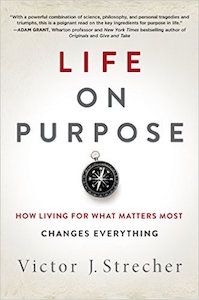Living with a Purpose Changes Everything
By Jill Suttie
According to a new book, having a purpose in life is crucial for our health and well-being.
According to a new book, having a purpose in life is crucial for our health and well-being.
Victor Strecher, a behavioral scientist at the University of Michigan’s School of Public Health, lost his 19-year-old daughter to a sudden heart attack in 2010. Her fragility and eventual death upended his thoughts on what life should be about and how to live it—and he was moved to write a book called Life on Purpose.
The book is first and foremost inspirational, focused on how the role of purpose in happiness and wellbeing has been debated by philosophers and discovered by individuals. It includes both Strecher’s personal revelations and those of others who’ve found purpose and changed the trajectory of their lives.
But the book is also a review on the science of purpose, which has blossomed in recent years. According to Strecher, the strength of one’s life purpose—which involves a combination of living according to your values and goals, and desiring to make a positive difference in the world—can be measured, and it correlates highly with psychological wellness and even markers of health and longevity.
For example, studies have found that for every one-point increase on a six-point scale measuring purpose in life, adults with heart disease have a 27 percent decreased risk of having a heart attack over a two-year period. For older adults, a one-point difference in purpose can mean a 22 percent decreased risk of having a stroke.
It’s not clear how purpose in life would have these impacts; but it’s possible that there is some kind of interaction with stress, which has already been shown to affect us at a cellular level. In one study, researchers looked at how meditation might impact gene health in highly stressed mothers. The length of mothers’ telomeres—the end caps on genes that tend to shorten with age—were measured before and after some of the moms attended a mindful meditation retreat.
Compared to a control group, women who’d received the meditation training did indeed have longer telomeres at the end of the retreat, suggesting better health. But the researchers found that this effect was accounted for not by increases in mindfulness, as expected, but by increases in a sense of life purpose, which the meditation inspired.
Studies like these show the potential positive impacts of purpose, which, Strecher argues, should encourage us to consider promoting it in our schools and workplaces. For example, students who are encouraged to consider education as relevant to their life purpose are more likely to try harder in classes they find boring or hard—such as science and math classes. And businesses that put purpose at the forefront tend to be more enjoyable places to work and more financially successful in the long run than those who only pursue profit.
In one study, researchers found that hospital workers were 45 percent more inclined to use good hand-washing hygiene if they were told it helped prevent patients from catching diseases than if they were told it helped them. Connecting their habits to a service-oriented purpose inspired better behavior.
“Pointing out to employees that their actions affect others can result in transcending behaviors—and save lives,” Strecher says.
Putting purpose into action
Of course, giving lip service to having a purpose in life is not going to cut it. It has to be genuine and to truly reflect your goals and values. Also, there is a difference between finding your purpose and acting upon it, says Strecher.
“The dynamic process of aligning yourself with your life purpose requires energy and willpower: wind in your sails to move you forward, and a strong rudder to prevent being blown off course,” he writes.
But how can we move from imagining our purpose to fulfilling it? Energy and willpower are needed, writes Strecher, and these can be boosted by making healthier lifestyle choices: sleeping and eating better, exercising, and being more present in your everyday life (e.g., through meditation or tai chi or other practices that increase your presence). The relationships between healthy lifestyle choices, energy, willpower, and purpose are all bidirectional—meaning they influence each other, he writes. Therefore, it makes sense to both figure out your purpose and engage more in healthy behaviors, in order to have enough energy and willpower to pursue your purpose. Much of his book is devoted to suggesting just how to do that.
Though studies found throughout the book lend some credence to Strecher’s claims about the benefits of purpose, they are relatively few in number and not always completely convincing. Even Strecher acknowledges that the science is still in its infancy.
“We still don’t know very much about interventions meant to increase purpose in life, let alone their results,” he writes.
Purpose may be more elusive than we realize—perhaps the culmination of a lifetime of personal interactions and individual experiences—and may be next to impossible to foster in the general public.
Still, it wouldn’t hurt the world if we all started examining our lives in deeper ways and tried a bit harder to find our own purpose. After all, any efforts that increase our desire to help the world are probably positive. And the consequences of not doing so could be dire.
“If I were you, I wouldn’t wait around for more research. I’d just get a purpose,” writes Strecher. “The scientific evidence supporting the benefits of one is extremely promising, and, at the risk of sounding a bit alarmist, we need it.”
